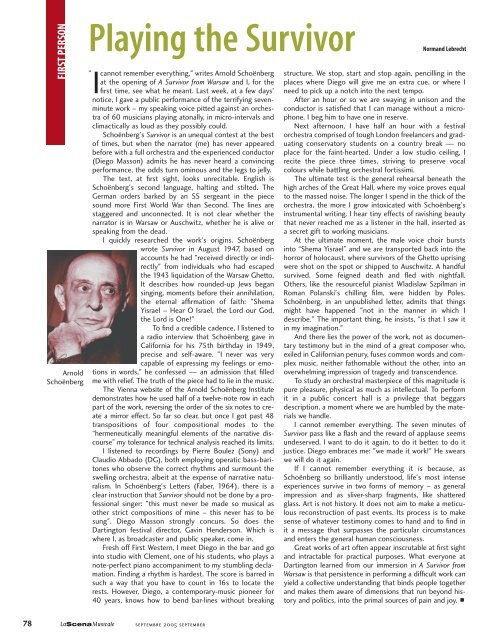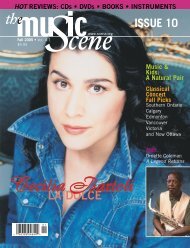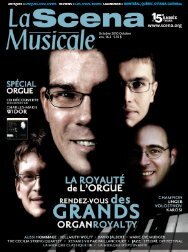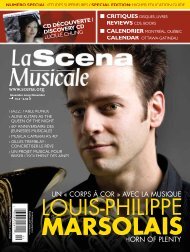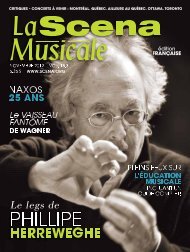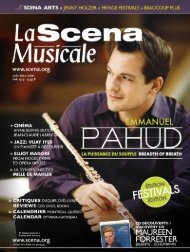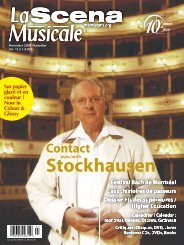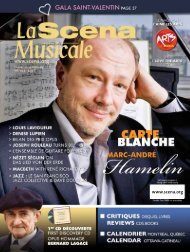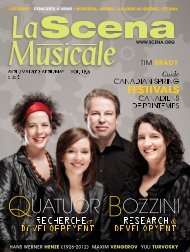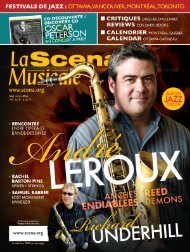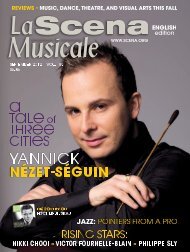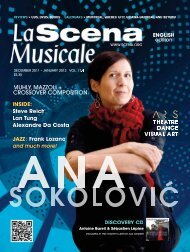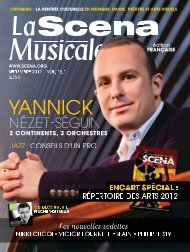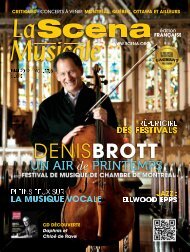Create successful ePaper yourself
Turn your PDF publications into a flip-book with our unique Google optimized e-Paper software.
FIRST PERSON<br />
Arnold<br />
Schoënberg<br />
Playing the Survivor Normand<br />
" Icannot remember everything," writes Arnold Schoënberg<br />
at the opening of A Survivor from Warsaw and I, for the<br />
first time, see what he meant. <strong>La</strong>st week, at a few days'<br />
notice, I gave a public performance of the terrifying sevenminute<br />
work – my speaking voice pitted against an orchestra<br />
of 60 musicians playing atonally, in micro-intervals and<br />
climactically as loud as they possibly could.<br />
Schoënberg's Survivor is an unequal contest at the best<br />
of times, but when the narrator (me) has never appeared<br />
before with a full orchestra and the experienced conductor<br />
(Diego Masson) admits he has never heard a convincing<br />
performance, the odds turn ominous and the legs to jelly.<br />
The text, at first sight, looks unrecitable. English is<br />
Schoënberg's second language, halting and stilted. The<br />
German orders barked by an SS sergeant in the piece<br />
sound more First World War than Second. The lines are<br />
staggered and unconnected. It is not clear whether the<br />
narrator is in Warsaw or Auschwitz, whether he is alive or<br />
speaking from the dead.<br />
I quickly researched the work's origins. Schoënberg<br />
wrote Survivor in August 1947, based on<br />
accounts he had "received directly or indirectly"<br />
from individuals who had escaped<br />
the 1943 liquidation of the Warsaw Ghetto.<br />
It describes how rounded-up Jews began<br />
singing, moments before their annihilation,<br />
the eternal affirmation of faith: "Shema<br />
Yisrael – Hear O Israel, the Lord our God,<br />
the Lord is One!"<br />
To find a credible cadence, I listened to<br />
a radio interview that Schoënberg gave in<br />
California for his 75th birthday in 1949,<br />
precise and self-aware. "I never was very<br />
capable of expressing my feelings or emotions<br />
in words," he confessed — an admission that filled<br />
me with relief. The truth of the piece had to lie in the music.<br />
The Vienna website of the Arnold Schoënberg Institute<br />
demonstrates how he used half of a twelve-note row in each<br />
part of the work, reversing the order of the six notes to create<br />
a mirror effect. So far so clear, but once I got past 48<br />
transpositions of four compositional modes to the<br />
“hermeneutically meaningful elements of the narrative discourse”<br />
my tolerance for technical analysis reached its limits.<br />
I listened to recordings by Pierre Boulez (Sony) and<br />
Claudio Abbado (DG), both employing operatic bass-baritones<br />
who observe the correct rhythms and surmount the<br />
swelling orchestra, albeit at the expense of narrative naturalism.<br />
In Schoënberg's Letters (Faber, 1964), there is a<br />
clear instruction that Survivor should not be done by a professional<br />
singer: "this must never be made so musical as<br />
other strict compositions of mine – this never has to be<br />
sung". Diego Masson strongly concurs. So does the<br />
Dartington festival director, Gavin Henderson. Which is<br />
where I, as broadcaster and public speaker, come in.<br />
Fresh off First Western, I meet Diego in the bar and go<br />
into studio with Clement, one of his students, who plays a<br />
note-perfect piano accompaniment to my stumbling declamation.<br />
Finding a rhythm is hardest. The score is barred in<br />
such a way that you have to count in 16s to locate the<br />
rests. However, Diego, a contemporary-music pioneer for<br />
40 years, knows how to bend bar-lines without breaking<br />
78 septembre 2005 september<br />
Lebrecht<br />
structure. We stop, start and stop again, pencilling in the<br />
places where Diego will give me an extra cue, or where I<br />
need to pick up a notch into the next tempo.<br />
After an hour or so we are swaying in unison and the<br />
conductor is satisfied that I can manage without a microphone.<br />
I beg him to have one in reserve.<br />
Next afternoon, I have half an hour with a festival<br />
orchestra comprised of tough London freelancers and graduating<br />
conservatory students on a country break — no<br />
place for the faint-hearted. Under a low studio ceiling, I<br />
recite the piece three times, striving to preserve vocal<br />
colours while battling orchestral fortissimi.<br />
The ultimate test is the general rehearsal beneath the<br />
high arches of the Great Hall, where my voice proves equal<br />
to the massed noise. The longer I spend in the thick of the<br />
orchestra, the more I grow intoxicated with Schoënberg's<br />
instrumental writing. I hear tiny effects of ravishing beauty<br />
that never reached me as a listener in the hall, inserted as<br />
a secret gift to working musicians.<br />
At the ultimate moment, the male voice choir bursts<br />
into “Shema Yisrael” and we are transported back into the<br />
horror of holocaust, where survivors of the Ghetto uprising<br />
were shot on the spot or shipped to Auschwitz. A handful<br />
survived. Some feigned death and fled with nightfall.<br />
Others, like the resourceful pianist Wladislaw Szpilman in<br />
Roman Polanski's chilling film, were hidden by Poles.<br />
Schoënberg, in an unpublished letter, admits that things<br />
might have happened "not in the manner in which I<br />
describe." The important thing, he insists, "is that I saw it<br />
in my imagination."<br />
And there lies the power of the work, not as documentary<br />
testimony but in the mind of a great composer who,<br />
exiled in Californian penury, fuses common words and complex<br />
music, neither fathomable without the other, into an<br />
overwhelming impression of tragedy and transcendence.<br />
To study an orchestral masterpiece of this magnitude is<br />
pure pleasure, physical as much as intellectual. To perform<br />
it in a public concert hall is a privilege that beggars<br />
description, a moment where we are humbled by the materials<br />
we handle.<br />
I cannot remember everything. The seven minutes of<br />
Survivor pass like a flash and the reward of applause seems<br />
undeserved. I want to do it again, to do it better, to do it<br />
justice. Diego embraces me: "we made it work!" He swears<br />
we will do it again.<br />
If I cannot remember everything it is because, as<br />
Schoënberg so brilliantly understood, life's most intense<br />
experiences survive in two forms of memory – as general<br />
impression and as sliver-sharp fragments, like shattered<br />
glass. Art is not history. It does not aim to make a meticulous<br />
reconstruction of past events. Its process is to make<br />
sense of whatever testimony comes to hand and to find in<br />
it a message that surpasses the particular circumstances<br />
and enters the general human consciousness.<br />
Great works of art often appear inscrutable at first sight<br />
and intractable for practical purposes. What everyone at<br />
Dartington learned from our immersion in A Survivor from<br />
Warsaw is that persistence in performing a difficult work can<br />
yield a collective understanding that binds people together<br />
and makes them aware of dimensions that run beyond history<br />
and politics, into the primal sources of pain and joy. p


